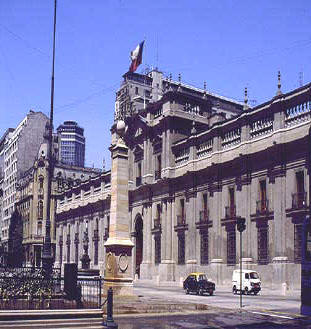|
||||||
|
History
Pre-Columbian Chile was peopled by a variety of ancient cultures, many of them politically subject to the Incas who they predated by many centuries. The country's varied topography governed the character of its population groups and the extent to which they were subject to Inca aggression. Native groupings included Aymara farmers in the desert north, who cultivated maize and tended flocks of llamas and alpacas; fisherfolk in the coastal areas; Diaguita Indians in the mountainous interior; Araucanian Indians in the center and south, whose fishing and agricultural settlements were barely touched by Incan incursions; and numerous groups of archipelagic hunters and fishers in the remote south.
All territory west of Brazil was granted to Spain by the 1494 Spanish-Portuguese treaty. The Spanish assigned the task of conquering Chile to Pedro de Valdivia, whose expedition reached Chile's fertile Mapocho Valley in 1541. Santiago was founded in the same year, with the cities of La Serena, Valparaíso, Concepción, Valdivia and Villarrica following soon after. |
|
|
The Río Biobío marked the southern extent of Spanish incursions, where they were barred by the resistance of the fierce Mapuche tribes. Valdivia rewarded his followers with enormous land grants, which resembled the great feudal estates of his Spanish homeland. Although mining and business outstripped agriculture as Chile's merchant megaliths, it was the social structure of the estates which shaped colonial Chile. The native population was devastated by the unwitting introduction of infectious diseases, and the mestizo population, the offspring of Spanish and Indian unions, were used as tenant laborers on these huge estates, many of which were still intact in the 1960s.
By the 1820s, the cumbersome methods by which taxation was extracted by a stagnant and complacent Spain allowed a flowering pan-American identity to blossom into a push for full independence. Simón Bolívar and José de San Martín led armies of freedom fighters from Venezuela to Peru, and from Argentina into Chile. Bernardo O'Higgins, son of an Irish immigrant and erstwhile viceroy of Peru, became supreme director of the new Chilean republic. The newly independent Chile was a fraction of its eventual size, consisting of Santiago and Concepción, and with fuzzy borders with Bolivia and Argentina. The coming of the railways and military triumphs over Peru and Bolivia in the War of the Pacific (1879-83) incorporated the mineral-rich Atacama desert to the north and the southern temperate territories. Chile quickly achieved a degree of political stability and relative democracy, enabling rapid agricultural development and the advancement of mining, industry and commerce. The now empowered working class and the nouveau riche both challenged the political power of the landowning oligarchy in a brief but bloody civil war in the 1890s.
The first half of the 20th century saw the political climate swing between right and left with no government having sufficient support to cement large scale reform. Infrastructure development was generally sluggish, leading to rural poverty and urbanization through desperation. It was not until the 1960s that social reforms were successfully instituted by the Christian Democrats, who targeted housing, education, health and social services. These policies threatened the conservative elite's privileges and also offended the radical left. Chile's politics were becoming increasingly militant, polarized and ideology-based when the Marxist Allende's leftist coalition of Socialists, Communists and extremists snuck to victory in 1970. Allende introduced sweeping economic reforms, including the state takeover of many private enterprises and the wholesale redistribution of income. The country was plunged into economic chaos and America was miffed by the expropriation of US-controlled copper mines, and also by Chile's conspicuously friendly relations with Castro's Cuba.
General Pinochet seized power in a bloody coup on 11 September 1973 using jets to bomb the presidential palace. Allende died, apparently by his own hand, and thousands of his supporters were murdered. Dark days followed, with assassinations, purges and enforced exiles commonplace. It is estimated that as many as 80,000 people were tortured or murdered. Rumors of CIA involvement in the coup were given credence by the US-instigated suspension of credit from international finance organizations, and the contemporaneous financial and moral support given to Allende's opponents.
At the head of a four-man junta, Pinochet dissolved Congress, banned leftist parties and suspended all opposition. Pinochet's monetarist economic policies brought stability and relative prosperity, but in a 1988 referendum to approve his presidency, voters rejected him by a majority of 7%. In the 1989 multiparty elections, Christian Democrat Patricio Aylwin beat Pinochet's candidate, Hernan Buchi, and power was peacefully transferred. Democracy returned to Chile although many of the previous regime's power brokers wield a lingering influence.
Eduardo Frei undertook the challenge of reconciling Chileans with their difficult past by accelerating human rights tribunals and inquiries into the fate of Chile's 2000 'disappeared'. Unfortunately, resistance from the political arm of the military machine severly hampered his efforts. Frei also struggled in matters of constitutional reform, failing to eliminate eight 'institutional senators' appointed by Pinochet who are not subject to a popular vote. Frei's economic reforms, however, did help alleviate crushing poverty to some degree.
Newly elected President Ricardo Lagos, formerly Frei's public works minister, is the first Socialist to hold the highest office since Allende. He defeated his right-wing rival, Joaquin Lavin, by a thin margin, securing 51.3% of the vote.
The newest wildcard in Chilean politics is Sentilde;or Pinochet himself, whose arrest in London in 1999 at the request of a Spanish judge investigating human rights violations unleashed an international furor. The general's temporary detention brought unresolved issues into the open for the first time in decades, but in February 2000 the general was pronounced too ill to stand trial and in early March he returned to Chile. |
|

